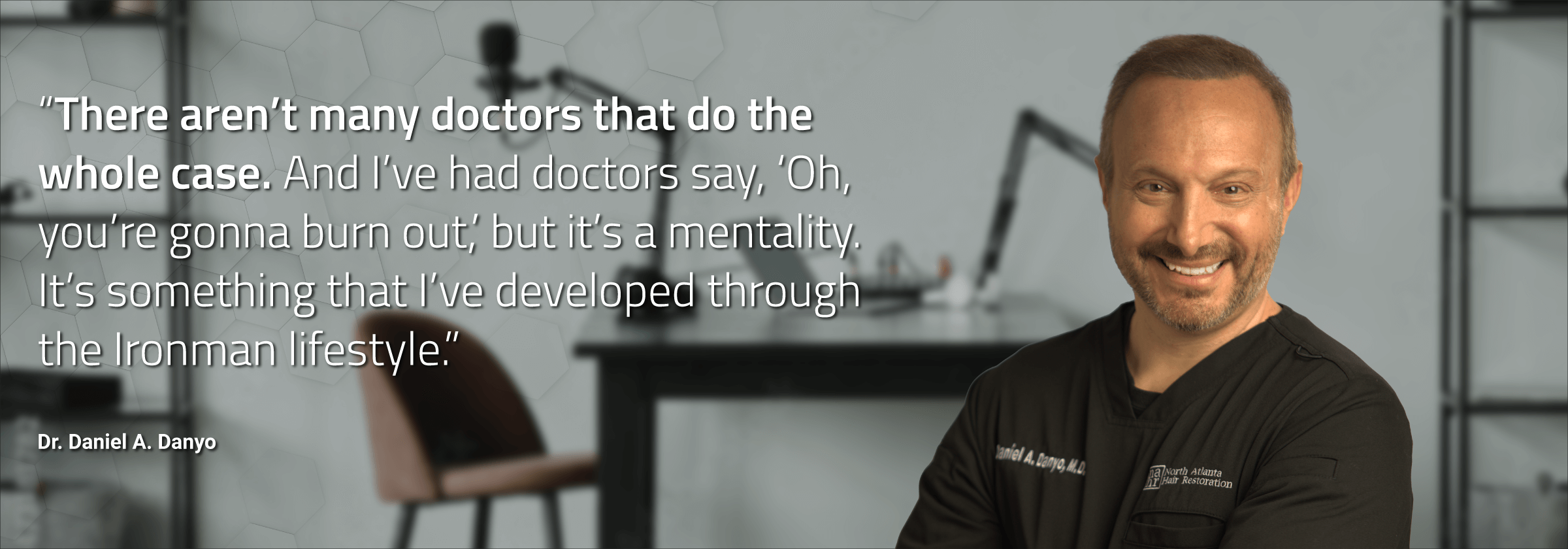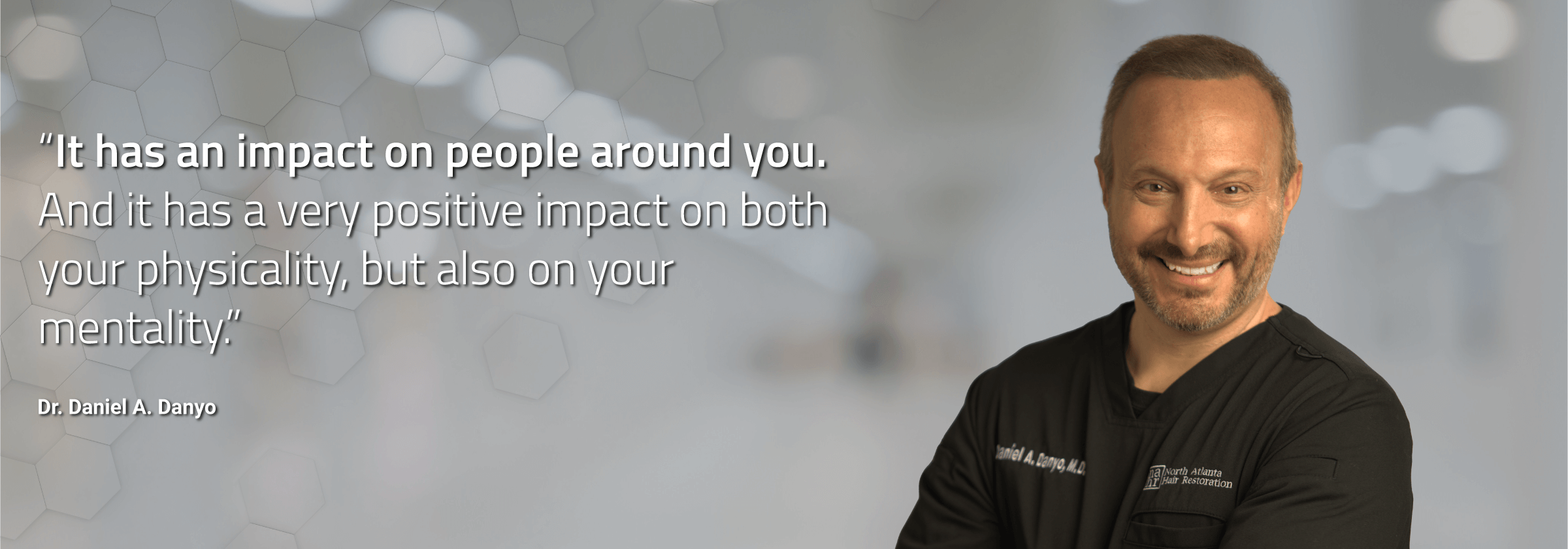The following is a transcript of Episode 13of the Hair Restoration With Dr. Daniel A. Danyo podcast.
All episodes of the podcast can be found at Apple Podcasts, Google Podcast, and Spotify.
Dr. Danyo: I wanna inspire people, you know, and not just inspire them with the hair, but like you said, I mean, people are at different stages in their life. And it’s really a great time where they’re bettering themselves with a hair transplant to talk about things where they can better themselves. And I’m not saying that they should jump in and do this, but you know, an Ironman or half Ironman, but at least have a mentality to say, you know what, I can do whatever I wanna do. And it just takes effort and intensity to get it done.
Clark: That was the voice of Daniel A. Danyo, M.D., founder and physician at North Atlanta Hair Restoration, a boutique medical practice solely dedicated to the diagnosis and treatment of male and female hair loss. And you’re listening to “Hair Restoration with Dr. Daniel A. Danyo.” I’m your host Clark, and all season long, we’re speaking with Dr. Danyo about how he and his team at North Atlanta Hair Restoration are helping his patients transform their everyday lives for the better.
In this episode, Dr. Danyo and I discuss some of the lessons he’s learned while training for Ironman races. He explains how learning to focus on technique and proceed at a steady pace has helped him become a better doctor. And he shares all about his passion for helping patients improve their lives. There’s a lot to talk about. So let’s dive right in Dr. Danyo, how are you?
Dr. Danyo: I’m doing great, Clark. How are you doing?
Clark: I’m doing great. I’m really excited about this topic. And I’ve heard you talk about this in passing over the last couple episodes, but today we’re actually talking about Ironman races, and I know you’re training for an Ironman right now.
Dr. Danyo: It’s a half Ironman.
Clark: Well, still. Okay. It’s been a while. You know, people hear about 5Ks and marathons. So first, just what are the specifics? And still, a half Ironman is a big deal, but what does that…and then I wanna hear about why are you doing this and why you think this makes you a better doctor and all that good stuff
Dr. Danyo: Sure. Well, you know, a triathlon, which an Ironman or half Ironman is part of the same scenario, it’s basically swim, bike, and run. So a full Ironman is a 4,000-meter swim, which is about 2.1 miles, and then the bike ride is 112 miles. And then the run is a marathon, which is 26.2 miles. So a half Ironman is essentially half of that, so they call it a 70.3 or 70.3 miles in total. So there’ll be a 2000-meter swim, a 56-mile bike ride, and then a half marathon, 13.1 miles.
Clark: Now, have you done these before?
Dr. Danyo: Yeah. I’ve done a couple half Ironmans. I’ve done some, you know, smaller triathlons, and then I’ve done two full Ironmans. Yeah, first one was in 2012 and Cosmo, Mexico. And then the second one was in 2015 in Chattanooga, Tennessee.
Clark: 2012, that’s not even 10 years ago you did your first Ironman?
Dr. Danyo: Yeah.
Clark: Yep. Now, did you start off with the full Ironman or…?
Dr. Danyo: No. I mean, I did like just a sprint triathlon, which is like an eighth of an Ironman. And then I did an Olympic, which is a quarter of an Ironman, and then a half, and then the full.
Clark: Whew. Oh, wow. So did you do all this stuff when you were, I don’t know, college-age years and after or just, kind of, a newer thing that you started doing?
Dr. Danyo: You know, it’s something that’s new. And actually, if you talk to people doing these races, I mean, a lot of people were overweight or they had some kind of life event and just said, you know, I wanna do something great and I wanna do one of these races and challenge myself. So I was in the same boat. In like 2005, actually, I literally weighed like 40 pounds heavier than I do now. I was over 200 pounds.
Clark: I did not know that. I’ve only seen pictures of you lately, you know.

Dr. Danyo: Yeah. I’m only 5’9″, and I have a smaller frame. So I definitely was in the obese range. And in 2005, I just, kind of, changed things work-wise, started working out with a trainer and started getting my diet under control. And that’s actually when I started really, kind of, educating myself outside of medicine, reading books on, you know, some favorite books like “Wheat Belly” was a big one to get out of processed food, gluten and processed foods, and read a lot about Ironman. And then one of my best friends, he and his brother were doing an Ironman and he said, “Come out for a ride with us one day.” So I ended up borrowing a bike and I went out for a 60-mile ride.
Clark: For the first time on a bike?
Dr. Danyo: For the first time. Yeah.
Clark: It’s like that Forrest Gump story, he starts running and never stops.
Dr. Danyo: Yeah. So you know they were like, “You’re like a natural bike rider.” So I ended up getting a bike and just really getting into it. I mean, I was riding to work, you know, 13 miles and riding back home 13 miles, and in the summer doing extra miles almost on a daily basis.
Clark: In Atlanta?
Dr. Danyo: North of Atlanta, there was, kind of, a safe way to do it. And then…
Clark: Okay. I was thinking in, like, the heart of Atlanta, that’d be pretty scary.
Dr. Danyo: Oh, I know. And then just got back into running and then swimming. My technique was bad and I did a master swim class through Lifetime Fitness and worked with a coach on my stroke and just really, kind of, got into it and, kind of, one of the foundations. And it really…I think about this all the time when I do hair transplant is that technique when you’re doing long tedious things like swimming, biking, running, and in an Ironman, you know, context, you have to have proper technique or you just get injured or you poop out.
Clark: That makes sense because we’ve talked about on this show, like when you do this kind of work, it’s very specific and it takes a long amount of time. And I’ve always tried to understand how does this guy sit still for an entire day doing each of these transplants by hand? Because there’s thousands of these whenever you do a procedure. I’ve always thought, how does he do this? And what I’m hearing from you is you’ve been training basically. You’ve transferred all of these skills and these experiences from that intense, steady work and training and racing. Wow.
Dr. Danyo: Yeah. Well, you know, it’s all about intensity, but then, you know, kind of, going for it. And it’s not easy to wake up…I have to train, you know, waking up at 4 in the morning and, you know, sometimes I’ll work out from even before 4 until right before 7, you know, get two or three hours of workout in, go to work, come back. I don’t want this to affect the family, so I don’t do a lot of this, like, in the evenings, or I do do some weekends, but I try and make it really early before my kids get up.
So it’s the same thing, you know, with hair transplant. There aren’t really many doctors that do the whole case. I’m talking all extractions, all placements on every patient. And I’ve had doctors say, “Oh, you’re gonna burn out. You know, there’s no way you’re gonna be able to continue this long-term,” but it’s a mentality. You know, it’s something that I’ve developed through…a lot is through just the Ironman lifestyle and, you know, perseverance and dedication to do all the training and ultimately do the races.
Clark: It’s inspiring that you have had such a transformation of your own body and your health, and we’ve also talked about this overall theme of when someone comes to see you, they’re looking to make changes in their life.
Dr. Danyo: Absolutely.
Clark: So have you seen any connections or overlays there?
Dr. Danyo: Sure. You know I think, you know, when I talk to patients like consults or just, you know, I get to spend an entire day with people when I do, you know, hair transplant, especially when it’s a big case. So I mean, a lot of times we have just tremendous conversations and, you know, one thing when I’m doing the case, you know, I have the freedom to actually listen to books, so I listen to a lot of books on the subject.
And so I just I wanna inspire people, you know, and not just inspire them with the hair, but like you said, I mean, people are at different stages in their life and it’s really a great time where they’re bettering themselves with a hair transplant to talk about things where they can better themselves. And I’m not saying that they should jump in and do this, but you know, an Ironman or half Ironman, but at least have a mentality to say, you know what, I can do whatever I wanna do. And it just takes effort and intensity to get it done.
Clark: Now, most recently, you have enrolled into another one of these, and I remember you telling me at the end of one of our calls recently about this story, but remind me, how did you get looped into the most recent one?
Dr. Danyo: Sure. Well, my 19-year-old daughter, soon to be 20, she’s a sophomore at the University of Georgia. And she called me up one day and said, “I’m gonna do a half Ironman and you’re coming with me.” So she had signed up for the St. George, Utah half Ironman. In fact, next year, they’re having the world championship full Ironman there. So this race is like, it was really tough to get in. I mean, she signed up and then I signed up that same day and I think it’s sold out because a lot of people wanna test the course and all that stuff. So there are gonna be some really, kind of, stout, you know, participants there. But anyway, yeah, she inspired me to do it and I guess I inspired her as she went to all the races in the past, and good for her.
Clark: Is this her first?
Dr. Danyo: It’s her first. Yeah, you have to be 18. So it is her first.
Clark: So she’s been training and learning from you on how to do all this.
Dr. Danyo: Yes. She’s got a training program, so she’s doing the swimming and she’s got a trainer in her apartment in Athens and doing the running and some lifting. And it’s important to have a training program because you can get really lost if you don’t. And it basically just, kind of, make these increments, you know, incremental steps in endurance and strength and with intermittent breaks because you can’t just train like a madman all the time because you’re just gonna break down. You have to recover and then build up.
Clark: Really. So how long is, like, a cool-down, like a couple of days, a week? How long?
Dr. Danyo: Yeah. I mean what you should do is…Let’s say, you know, we started, like, the first of the month. So the first week is gonna be moderate, the next week is gonna be hard, the third week’s gonna be very hard, and the fourth week could be literally almost complete rest week, you know, stretching, maybe go out and get a massage, you know, kind of work on some general strengthening, but not really doing a ton of cardio. And then the next week you just go up a little bit higher. So you build these steps with recovery and the recovery needs to be, you know, five to seven days to get the full benefit of what she just did over the last three weeks.
Clark: Very exciting. I am feeling maybe one day, I’ll get to do that. I might try to challenge myself. That sounds like a very challenging thing.
Dr. Danyo: Yeah. You know, it’s amazing when you do these races. So, first of all, I mean, it’s not a competition. I mean, it’s a full participation sport. We don’t make any money doing it. It takes time from our family. It’s, kind of, self-centered, but at the same time, it has an impact on people around you. And it has a very positive impact on, you know, both on your physicality, but also on your mentality because you do these races and the human spirit is in full gear, and it’s just awesome to be part of that and it’s awesome to experience it.
Clark: Wow. Just another interesting thing is when you were just saying when you’re working with someone with a hair transplant, you’re with them the entire time, and sometimes they choose, I mean, they’re just gonna hang out and talk with you, is that right? Or sometimes they’ll listen to something too. Did I hear you right?
Dr. Danyo: Sure. Yeah. I mean you know, sometimes we’ll talk all day. The girls love it when I do that. No, I’m kidding. But, you know, a lot of times we have, you know, periods of downtime, say at lunch, or, you know, intermittently during the day we can talk. We also, in the afternoon when we’re placing, I’ve got some good movies just on, you know, some great…like, we have a couple of climbing movies and, kind of, nature movies or adventure sports. It’s just nice clean stuff. Everyone, kind of, gets excited, you know, while they’re watching it. And so a lot of our discussion is kind of, you know, kind of, come out from there.
Clark: So when someone gets a hair transplant, and let’s say they’re gonna do an Ironman, for instance, or any kind of activity, is there anything that they can’t do that they would have done? Does that make sense? Like, that might be a silly question, but…
Dr. Danyo: You’re talking like immediately after?
Clark: Well, just, I guess in general, I guess once you’ve recovered, and I know the recovery is not that long.
Dr. Danyo: Yeah. Well, once you’re recovered, you’re totally fine. I mean, you just have to, you know, watch it the first two weeks, like wearing a bike helmet and things like that, or like diving into a pool, for like the first month your head’s gonna be pretty sensitive. But otherwise, after the first week, I mean, there’s really no restrictions on sweating and working out and stuff like that.
Clark: Wow. Because your body is…it’s your hair and so your body is…like, what is happening from the scientific perspective of when it’s…after you’ve done this? You know, how does it…You’re replanting a tree. So I guess once that tree’s roots are established, then, you know, if there’s a storm, so to speak, that tree is not going anywhere. So the way that translates is if you’re…hey, let’s say you’re doing an Ironman or something like that, you’re biking, you’re out swimming, you’re running, everything’s gonna be fine.
Dr. Danyo: Yes. Yeah. I mean, everything’s pretty much grafted at seven weeks and the hair is going to basically operate like it did in the back of the hair, just in a different spot. So it’s not gonna be an issue.
Clark: Wow. Now, do you think there’s ever gonna be a time you’re gonna slow down on the Ironmans?
Dr. Danyo: Yeah. I mean, I’d like to do a full Ironman when I’m 60 and 70, you know.
Clark: Geez. Does that happen, that’s a normal thing?
Dr. Danyo: Yeah, yeah. They write your age on the back of your calf, and it’s amazing how many people are in their 60s and even 70s that I’ve seen running out there. And again, it’s a lifestyle and it’s the human spirit, you know, just to go for it and just be part of something great.
Clark: Awesome. Well, I appreciate you sharing a little bit of insight into this. I know it’s a little bit of a different topic than what we’re normally talking about, but it definitely brings a light to the work you do and the kind of dedication and patience and persistence that you have when you’re either doing an Ironman or, you know, working there in North Atlanta, you know, doing the hair transplant, so very helpful to understand.

Dr. Danyo: Yeah, well, I think the two go hand in hand.
Clark: Well, good luck to your daughter on her first Ironman. I know….and you’re doing that with her, so it’s gonna be an exciting time for you both.
Dr. Danyo: It’s gonna be awesome.
Clark: Cool. Well, I look forward to another chat with you soon.
Dr. Danyo: All right, Clark. Excellent. Take care.
Clark: Thanks for listening to “Hair Restoration with Dr. Daniel A. Danyo.” Book your consultation today with Dr. Danyo by simply calling 678-845-7521 or visit them online at nahairrestoration.com, and be sure to subscribe, rate, and review the podcast wherever you listen to your favorite podcasts.

